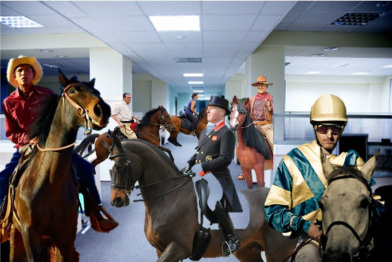
Putting a visual framework on that, it's as if they are each two beings in one. Much as their 'emotionally' driven old-brains are inter-linked in many ways to the higher level cortex (which by its size alone makes us uniquely human), they often act as if they were distinct entities.
I find it helps to imagine people as double-brained beings when I interact with them; a rational thinking part which we all pretend to be and a strangely predictable instinctive part which can bring on emotions as varied as being loving and caring to being spiteful and dishonest.
Try imagining your office colleagues as horses and riders; the horse representing their instinctive older brain and their persona as a rider being the rational 'in-control' part we'd all like to think that we are. It would lead to a crowded office but it might explain some of the daily misunderstandings! More at: http://www.lazyhorses.com/the-horse-and-rider.html


 RSS Feed
RSS Feed